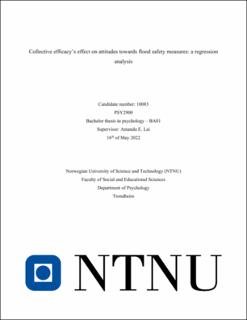Sammendrag
Research on collective efficacy in the context of climate change and natural hazards is somewhat limited. This study explores how collective efficacy affects attitudes towards flood safety measures, both directly and indirectly through the mediators; flood risk perception and place identity threat. Firstly, it was hypothesized that collective efficacy would negatively predict flood risk perception. Secondly, it was hypothesized that flood risk perception would negatively predict place identity threat due to safety measures, and positively predict place identity threat due to increasing flood hazards. It was also predicted that place identity threat due to safety measures would negatively predict acceptability of these measures. In addition, it was assumed that place identity threat due to increasing flood hazards would positively predict acceptability of the safety measures. Lastly, it was hypothesized that collective efficacy would directly predict acceptability of the safety measures. Collective efficacy was found to increase acceptance of safety measures, but no relationship between collective efficacy and risk perception was found. Additionally, none of the indirect effects through mediators were found to be significant. Results were discussed using protection motivation theory in the context of climate change and natural hazards.
